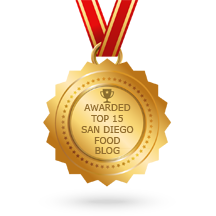Caffé Calabria: Full of Beans in North Park

So, I scoured the stories for any hints on where to buy good decaf beans in
At the time, I told the saga of my frustrating quest to one of the baristas, who called over owner Arne Holt. He stopped what he was doing and showed me around the premises, which are far more than a mere coffeehouse storefront. It’s a full on coffee mecca with 22- and 45-kilo roasters, the latter a restored 1958 German machine with gleaming stainless steel.
In a back room, he was preparing to set up a retail space for selling home brewing equipment and accessories. Upstairs are the business offices. In the basement, bags and burlap bags of coffee beans. He told me about his plans to add an authentic Italian pizza oven. All this, and I was just a person who had walked in off the street looking for a good cup of coffee.
I stopped back a couple of days ago to buy some more coffee and the first thing I noticed was the blue-and-white tiled beehive-shaped pizza oven, still a work in progress, but a formidable presence in the coffeehouse.
Holt was in, having just returned at 5:30 that morning from a trip to Italy where he had bought a coffee bar that will be the centerpiece of a remodeling aimed, as he says, “to bring the culture of Italy to our front door.
“We’ll serve coffee and panini during the day, and five nights a week we’ll shut down at 3 p.m. and re-open at 5 p.m. as an enoteca, or wine bar, and serve pizza,” he says. “And, it will be verra pizza Napoletana,” he emphasizes, “authentic, true Neapolitan pizza."
In fact, the oven is being constructed out of materials from
In the meantime, however, there’s always the coffee. Caffé
And, for tea lovers, the back room, still in transition mode for the retail space, has endless canisters of teas, blended by the staff and sold under the name Sochi Teas.
In the coffeehouse, I noticed a stack of burlap bags below a cup with the lettering, “Get Smart,” and asked Holt what this was all about. Before I knew it, we were heavy into a discussion on Fair Trade issues. He explained that for years, they regularly piled the bags there for people to take, but that they have started a donation project, Get Smart, to raise money to help pay for children in Matagalpa, Nicaragua, to attend school. Take a bag, put a little money for it into the cup and help provide an education, with Caffé
More than that, though, it represents a larger effort spurred by a profound skepticism Holt has with the Fair Trade certification program. “I don’t think the money’s going to the right people,” he says. Concerned about abuses in the program, he has decided to visit the farms he buys beans from to determine for himself if they meet his criteria, which includes using organic fertilizers and compost, maintaining the land and trees and treating the people who work on the farm with respect. “I want to see that they’re growing coffee with the earth, making sure everything is sustainable, whether they are ‘certified’ or not,” he says. “It’s a matter of treating the land with love and the people who work on the farm with love.
“The goal is to have all our coffee purchased under this criteria,” he notes. “The larger goal is buying consciously.” His first farm visit was to Matagalpa, where he’ll be returning soon. Hence, the burlap bag donations.
While buying sustainably is commendable, ultimately, the coffee has to taste good or there are no customers. Monday through Friday, Caffé
“Coffee is so volatile,” says Holt. “It’s always changing. It can start out with a fruity flavor, then develop more citrus tones. We need to cup it out everyday to make sure we’ve got a good product.”
As if the pizza and sustainable buying projects aren’t enough, Holt has one more novel twist to add to the business, a Clover bar.
If you haven’t heard of this, it may be because
Caffé
Oh, and if you go in to buy coffee beans at lunchtime, pick up the grilled vegetable panini (a wonderful melding of eggplant, zuccini, red onions and tomatoes on crunchy foccacia) and have the barista make you a Café Viennese. This (decaf, for me) espresso concoction made with steamed milk, honey and cinnamon is layered with so many delicious, complementary flavors, it made me weak in the knees with pleasure.
Caffé
Have some thoughts about Caffé


















Caron,
ReplyDeleteI don't even like coffee that much, but your posting about Caffe Calabria makes me want to begin a new habit!
Hurray! A new place to get a fix and fresh beans besides Starbucks and Pete's. Quit your full-time job and blog on, Caron.
ReplyDeleteBest coffee in San Diego, hands down. The other roasters in SD are good, but CC is superior. Barista's can be a little short sometimes, and not always passionate, but the drinks are usually extremely carefully prepared and delicious. I recommend it!!
ReplyDelete